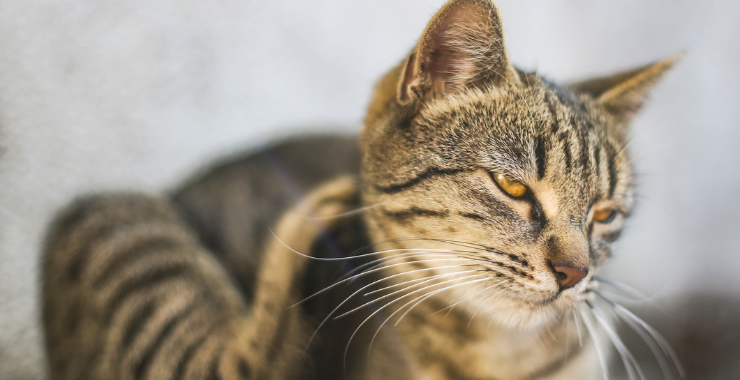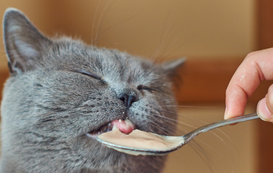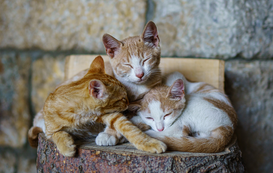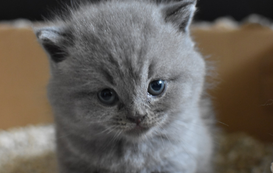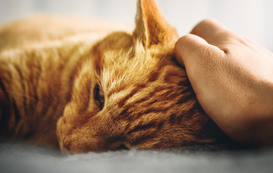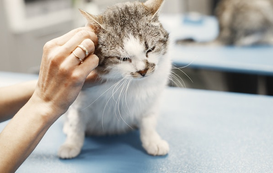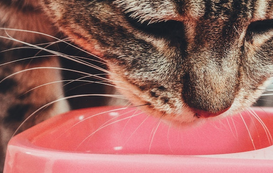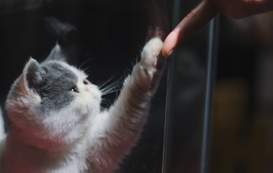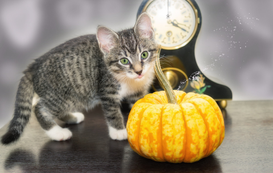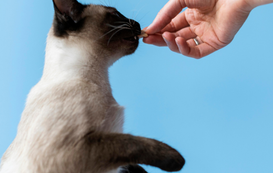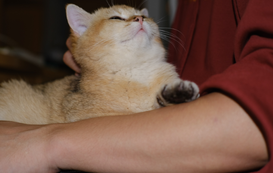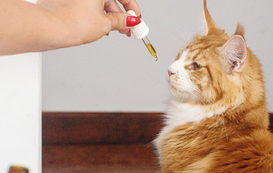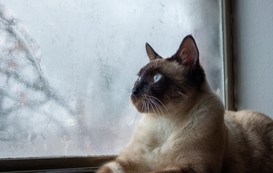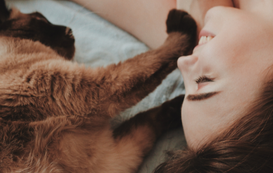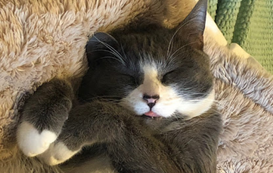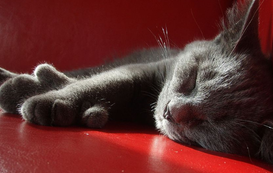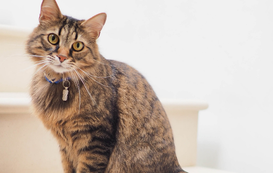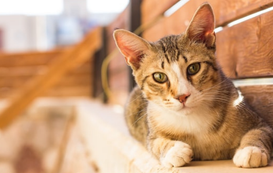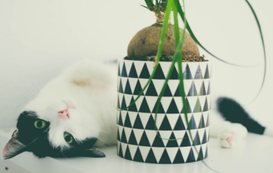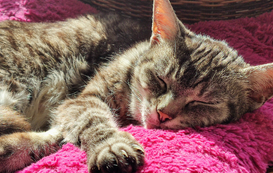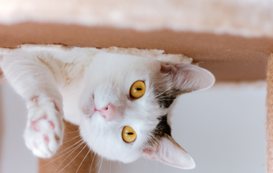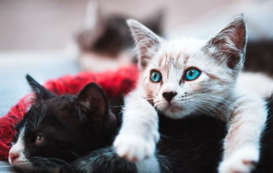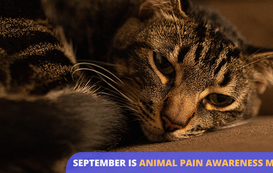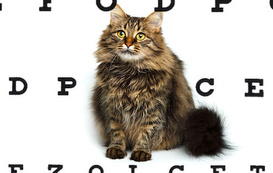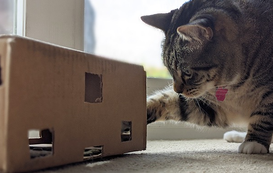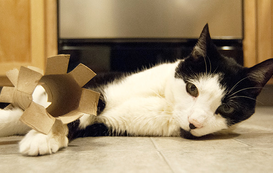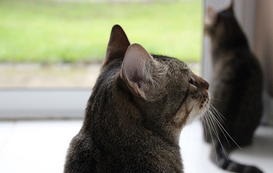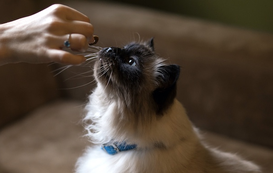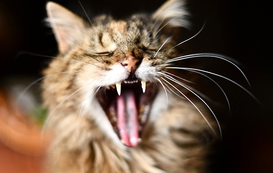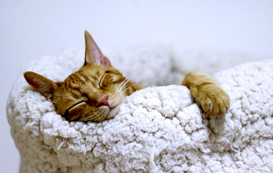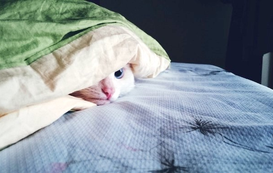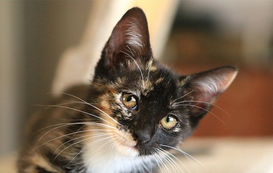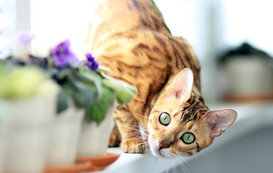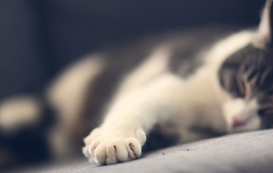Does your cat seem to be scratching themselves more than usual?
If so, their excess scratching should be taken seriously, as sometimes itchy skin can be much more than a minor nuisance to your kitty.
Skin issues are relatively common in cats, and itching is a symptom of several serious conditions. If you find your cat suddenly suffering from itchy skin, your best first step is to consult your veterinarian.
Meanwhile, it's a great idea to be informed so you can know what to look for and ways to deal with causes of itchy skin. And that's just the guidance we're sharing since August is Itchy Pet Awareness Month.
How do I know if my cat has itchy skin?
Obviously, the first sign that your cat's skin is itchy is seeing them scratching more than usual. Secondly, you may notice flakes of skin that look much like human dandruff (known as pet dander) or white, scaly patches on the skin.
Another visible sign of itching is skin irritation (i.e., redness or inflammation) that you notice when grooming or petting your cat. The irritation may be especially noticeable if some of their fur has gotten sparse or is missing. You may see this sign appear before you have even noticed any excess scratching. Some cats are known for being 'secret lickers' - licking themselves so much when you're not looking to relieve the itch and irritation that it causes hair loss. If you notice your cat's coat is thinning or even developing bald spots, overgrooming due to itch could be to blame.
Some cats with allergies may not show any visible reactions on their skin. However, the stinging sensations they perceive internally may cause them to behave strangely: They may be agitated, lick themselves nervously, or perhaps even bite themselves.
What are the typical causes of itching in cats?
Itchy skin in cats is usually caused by one of the following:
- Allergies
- Autoimmune disease
- Fungus (e.g., ringworm)
- Lack of grooming
- Parasites
Are parasites to blame?
Parasites (e.g., lice, fleas, and scabies) are among the most typical causes of itching in cats, with fleas being the most likely culprit.
If your cat has fleas, you will probably be able to see them upon close examination. You may even notice them hopping around on your cat. You will probably also see 'flea dirt' - this is the feces of adult fleas, which is reddish-black due to the fleas' consumption of blood.
Don't spot any fleas? Just because you don't see them doesn't mean your cat doesn't have them - they could be hiding! While holding your kitty, caress their fur against the direction of hair growth, looking closely at fleas' favorite hiding spots like the armpits, neck, hind legs, and groin.
Even if you only see one or two fleas, it's time to take action to get rid of them, as the problem can compound itself daily. (Female fleas can lay up to 50 eggs a day!)
Fortunately, flea control in cats is not as complicated as you may think. First, diligently use a flea comb on your cat, paying extra attention to the neck area and the base of the tail. Treatment options for fleas include sprays, powders, special shampoos, topical preparations, and oral medications. According to VCA Animal Hospitals, treating the home environment is also vital. Methods to control fleas in the home include adulticide sprays, sprays containing IGR, and insecticides applied by professional pest control companies.
Could it be an allergy?
Allergies are the second most common cause of itching in cats. Common allergies in cats include allergies to:
- Food
- Inhaled materials (e.g., pollen)
- Parasites (e.g., fleas)
- Contact allergies (i.e., things that touch the skin) (e.g., wool)
- Medication allergies
Food allergies are caused by an immune reaction to a food or food additive. Or, the cat might have an undiagnosed medication allergy. A detailed examination of your cat's diet and medications is warranted if an allergic reaction to food or medicine is believed to be the cause of the reaction.
You may be surprised that cats can have seasonal allergies like humans. Cats experience some of the same symptoms as humans with seasonal allergies, but itchy skin is the most common one. Constant itchiness in the springtime with no other apparent cause means pollen may be pestering your kitty.
Further, a cat might be allergic to a particular parasite. Flea allergy - the most common allergy in cats - means fleas are far more than a minor irritation and can lead to painful sores, ultimately resulting in secondary bacterial skin infections.
Contact allergies can be attributed to things touching a cat's skin, like flea collars or certain types of bedding.
What else could be to blame?
If you cannot easily attribute your cat's itchy skin to something evident like fleas, it's time to take action. Take your cat to the vet for a professional opinion on what may be causing the problem. It may be something entirely unexpected.
For instance, a cat with an ear infection may scratch at their face, the side of their head, and, of course, their ear since the condition can cause itching and irritation inside the ear.
Bacterial infections, yeast infections, skin cancer, immune-related illnesses, and endocrine gland dysfunctions can also cause a cat to experience itchiness. These conditions' roles in the itching vary greatly and are not always apparent at first glance. Thus, they require an expert diagnosis and treatment.
To find the best treatment for ongoing or recurring skin problems, a vet needs to first identify the underlying cause of the symptoms. Fortunately, treating the underlying condition will help the cat feel better from the core condition and often take care of the cat's skin problem as well.
What can I do to help my cat feel better?
Giving a cat a gentle bath with a soothing shampoo can sometimes improve skin symptoms, especially if they result from an allergy. As much as most cats don't like taking a bath, the relief they will feel afterward is worth the effort. However, if your kitty finds being bathed too stressful, you may not want to subject them to one - only you know your cat best.
If you do choose to bathe your cat, it's important to use an extremely gentle soap on their irritated skin. (You don't want anything that has a lot of chemicals in it because they could aggravate the allergy symptoms even more.) Cat-specific shampoos, including formulas with soothing ingredients such as colloidal oatmeal, are available. If you aren't bathing them, colloidal oatmeal is also available in sprays and lotions. This ingredient is often very helpful in relieving skin concerns as it keeps moisture in while reducing redness and swelling.
Your vet may prescribe a single treatment or a combination of multiple treatments for your cat's itchy skin. Medication-based treatment options such as ointments, oral medication, and antibiotics, as well as antihistamines can be highly effective. (Note: The over-the-counter allergy medication Benadryl is sometimes used to treat allergies and allergic responses in cats. However, you should consult your veterinarian before administering any medication that is out of the ordinary.)
Supplements may also prove beneficial in treating skin issues, but they should only be given under the advice of a vet. For instance, an omega-3 fatty acid fish oil supplement frequently helps to decrease or eliminate dandruff, reduce itchiness, and make a cat's coat look better overall. Omega-3 supplements are available in treats, capsules, and liquid formulas. Most cat parents find liquid supplements the easiest to administer. It can take a few weeks to see the full effects of this supplement, so don't give up if you don't see quick results.
Dietary changes may also be necessary in order to resolve your cat's itchy skin, especially if allergies are found. Grain-free diets may be prescribed for cats with food allergies in particular. Your vet may suggest that your cat follow an elimination diet and a trial diet to see if the symptoms subside after eliminating certain ingredients. (Note: Don't make any significant changes to your cat's diet before talking to your veterinarian.) The goal of both is to ultimately identify ingredients that trigger flare-ups and avoid them.
In some situations, a kitty may need to temporarily wear an Elizabethan collar to stop licking and biting the irritated areas of their skin until they can heal.
Regardless of the treatment form, it's essential to see it through. The therapy may be short-term or long-term, depending on your cat's overall health and the recurrence of their symptoms. Follow the vet's orders strictly and continue treatments as long as you're advised to do so in order to prevent your cat's problems from worsening or recurring.
The Takeaway
Itchy skin in cats is not unusual, but it can have various causes for which treatment can sometimes be complicated. The services of a professional are necessary if itchy skin is an ongoing or recurring problem. Remember - your kitty can't tell you they're uncomfortable, so it's up to you to observe them and take appropriate action.
Frequently Asked Questions
Q: How can I distinguish between normal scratching and something more serious that requires a vet visit?
A: Distinguishing between normal scratching and a serious condition needing vet attention involves monitoring the frequency, intensity, and any accompanying symptoms like skin redness, hair loss, or behavior changes.
Q: What are some home remedies I can try before consulting a vet for my cat's itchy skin?
A: For mild cases, gentle baths with cat-specific, soothing shampoos can provide relief. However, always consult a vet before trying home remedies to avoid aggravating the condition.
Q: How can I prevent itchy skin issues in my cat in the future?
A: Preventing itchy skin starts with regular grooming, a balanced diet, flea prevention, and reducing stress in your cat's environment. If symptoms persist or worsen, a vet can offer tailored advice and treatment.
Ready to find the purrfect sitter for your feline friend? Find a cat sitter on Meowtel today!
Photo by Anonymous

